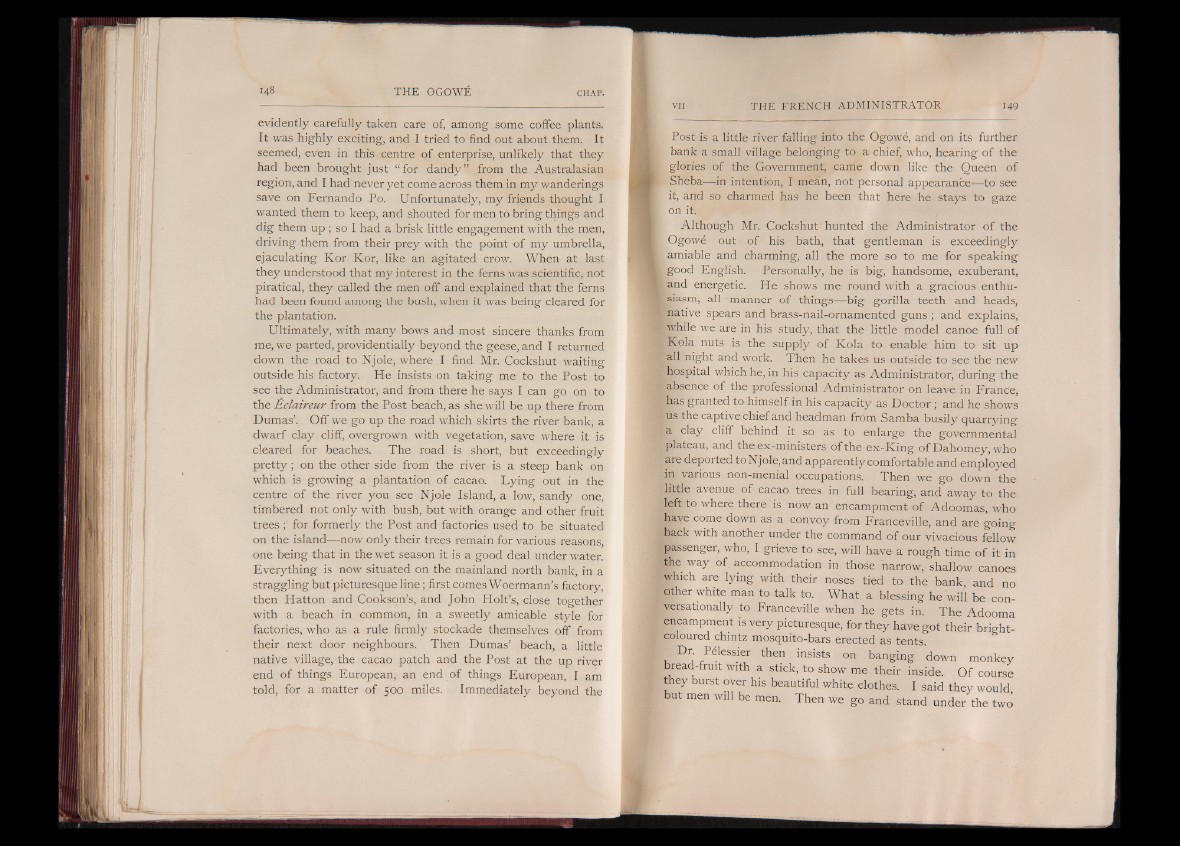
evidently carefully taken care of, among some coffee plants.
It was highly exciting, and I tried to find out about them. It
seemed, even in this centre of enterprise, unlikely that they
had been brought just “ for dandy” from the Australasian
region, and I had never yet come across them in my wanderings
save on Fernando Po. Unfortunately, my friends thought I
wanted them to keep, and shouted for men to bring things and
dig them u p ; so I had a brisk little engagement with the men,
driving them from their prey with the point of my umbrella,
ejaculating Kor Kor, like an agitated crow. When at last
they understood that my interest in the ferns was scientific, not
piratical, they called the men off and explained that the ferns
had been found among the bush, when it was being cleared for
the plantation.
Ultimately, with many bows and most sincere thanks from
me, we parted, providentially beyond the geese, and I returned
down the road to Njole, where I find Mr. Cockshut waiting
outside his factory. He insists on taking me to the Post to
see the Administrator, and from there he says I can go on to
the Eclaireur from the Post beach, as she will be up there from
Dumas’. Off we go up the road which skirts the river bank, a
dwarf clay cliff, overgrown with vegetation, save where it is
cleared for beaches. The road is short, but exceedingly
pretty; on the other side from the river is a steep bank on
which is growing a plantation of cacao. Lying out in the
centre of the river you see Njole Island, a low, sandy one,
timbered not only with bush, but with orange and other fruit
trees ; for formerly the Post and factories used to be situated
on the island— now only their trees remain for various reasons,
one being that in the wet season it is a good deal under water.
Everything is now situated on the mainland north bank, in a
straggling but picturesque line; first comes Woermann’s factory,
then Hatton and Cookson’s, and John Holt’s, close together
with a beach in common, in a sweetly amicable style for
factories, who as a rule firmly stockade themselves off from
their next door neighbours. Then Dumas’ beach, a little
native village, the cacao patch and the Post at the up river
end of things European, an end of things European, I am
told, for a matter of 500 miles. Immediately beyond the
Post is a little river falling into the Ogow6, and on its further
bank a small village belonging to a chief, who, hearing of the
glories of the Government, came down like the Queen of
; Sheba-—in intention, I mean, not personal appearance— to see
it, and so charmed has he been that here he stays to gaze
t on it.
Although Mr. Cockshut hunted the Administrator of the
e Ogowe out of his bath, that gentleman is exceedingly
I amiable and charming, all the more so to me for speaking
I good English. Personally, he is big, handsome, exuberant,
l and energetic. He shows me round with a gracious enthu-
I siasm, all manner of things— big gorilla teeth and heads,
\ native spears and brass-nail-ornamented guns; and explains,
while we are in his study, that the little model canoe full of
■¡Cola nuts is the supply of Kola to enable him to sit up
all night and work. Then he takes us outside to see the new
hospital which he, in his capacity as Administrator, during the
absence of the professional Administrator on leave in France,
Ifcas granted to himself in his capacity as Doctor j and he shows
| us the captive chief and headman from Samba busily quarrying
a clay cliff behind it so as to enlarge the governmental
plateau, and the ex-ministers of the ex-King of Dahomey, who
are deported to Njole, and apparentlycomfortable and employed
in various non-menial occupations. Then we go down the
little avenue of cacao trees in full bearing, and away to the
left to where there is now an encampment of Adoomas, who
have come down as a convoy from Franceville, and are going
back with another under the command of our vivacious fellow
passenger, who, I grieve to see, will have a rough time of it in
phe way of accommodation in those narrow,- shallow canoes
which are lying with their noses tied to the bank, and no
fcher white man to talk to. What a blessing he will be conversationally
to Franceville when he gets in. The Adooma
encampment is very picturesque, for they have got their bright-
coloured chintz mosquito-bars erected as tents.
I Pelessier then insists on banging down monkey
bread-fruit with a stick, to show me their inside. Of course
they burst over his beautiful white clothes. I said they would
but men will be men. Then we go and stand under the two